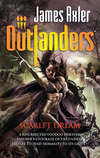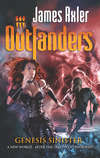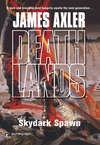Buch lesen: «Scarlet Dream»
Ezili Coeur Noir smiled at the noise, enjoying the terrible, familiar song of death reversed. All of the corpses had done this when she had revived them; each had sung a beautiful note of pain. It was so pure, so absolute, she wished to one day make an orchestra of these corpses, killing and reviving them to create the music she heard echoing in her black heart.
Already she was walking down the road, instinctively searching for another dead body, feeling herself drawn to it as she repopulated the Earth with her army of the undead. But soon she would not need to search. Once the Red Weed batch was completed by her lackeys, Ezili Coeur Noir would have an endless supply of the dead to reanimate, a perfect orchestra to scream her beautiful songs of death. And prized among those singers would be the three humans she had found in the underground bunker of the redoubt, the three who had challenged her with the brightness of their living souls.
Scarlet Dream

Outlanders®
James Axler

Call no man happy till he is dead.
—Aeschylus, 525–456 B.C.
The Road to Outlands— From Secret Government Files to the Future
Almost two hundred years after the global holocaust, Kane, a former Magistrate of Cobaltville, often thought the world had been lucky to survive at all after a nuclear device detonated in the Russian embassy in Washington, D.C. The aftermath—forever known as skydark—reshaped continents and turned civilization into ashes.
Nearly depopulated, America became the Deathlands—poisoned by radiation, home to chaos and mutated life forms. Feudal rule reappeared in the form of baronies, while remote outposts clung to a brutish existence.
What eventually helped shape this wasteland were the redoubts, the secret preholocaust military installations with stores of weapons, and the home of gateways, the locational matter-transfer facilities. Some of the redoubts hid clues that had once fed wild theories of government cover-ups and alien visitations.
Rearmed from redoubt stockpiles, the barons consolidated their power and reclaimed technology for the villes. Their power, supported by some invisible authority, extended beyond their fortified walls to what was now called the Outlands. It was here that the rootstock of humanity survived, living with hellzones and chemical storms, hounded by Magistrates.
In the villes, rigid laws were enforced—to atone for the sins of the past and prepare the way for a better future. That was the barons’ public credo and their right-to-rule.
Kane, along with friend and fellow Magistrate Grant, had upheld that claim until a fateful Outlands expedition. A displaced piece of technology…a question to a keeper of the archives…a vague clue about alien masters—and their world shifted radically. Suddenly, Brigid Baptiste, the archivist, faced summary execution, and Grant a quick termination. For Kane there was forgiveness if he pledged his unquestioning allegiance to Baron Cobalt and his unknown masters and abandoned his friends.
But that allegiance would make him support a mysterious and alien power and deny loyalty and friends. Then what else was there?
Kane had been brought up solely to serve the ville. Brigid’s only link with her family was her mother’s red-gold hair, green eyes and supple form. Grant’s clues to his lineage were his ebony skin and powerful physique. But Domi, she of the white hair, was an Outlander pressed into sexual servitude in Cobaltville. She at least knew her roots and was a reminder to the exiles that the outcasts belonged in the human family.
Parents, friends, community—the very rootedness of humanity was denied. With no continuity, there was no forward momentum to the future. And that was the crux—when Kane began to wonder if there was a future.
For Kane, it wouldn’t do. So the only way was out—way, way out.
After their escape, they found shelter at the forgotten Cerberus redoubt headed by Lakesh, a scientist, Cobaltville’s head archivist, and secret opponent of the barons.
With their past turned into a lie, their future threatened, only one thing was left to give meaning to the outcasts. The hunger for freedom, the will to resist the hostile influences. And perhaps, by opposing, end them.
“Call no man happy till he is dead.”
—Aeschylus, 525-456 BC
Contents
Chapter 1
Chapter 2
Chapter 3
Chapter 4
Chapter 5
Chapter 6
Chapter 7
Chapter 8
Chapter 9
Chapter 10
Chapter 11
Chapter 12
Chapter 13
Chapter 14
Chapter 15
Chapter 16
Chapter 17
Chapter 18
Chapter 19
Chapter 20
Chapter 21
Chapter 22
Chapter 23
Epilogue
Chapter 1
She had surrounded herself with dead things, for she found their company more agreeable now than that of the living.
Her name was Ezili Coeur Noir and she was the queen of all things dead, the flower of carnage. She stood over six feet tall and her limbs were bird-thin sticks, like the tools of some perverse surgeon. Her skin clung so tightly to those limbs that it seemed as if it would crush the stick-thin bones that were visible beneath. That skin was the rippled leather of a lizard, discolored and rotten with oozing wounds, as if in sympathy with the dead things she had elected to surround herself by. She stood upon two spindly, emaciated legs at an odd angle, as if no longer able to hold herself straight, which left her looking like some hideous mannequin discarded by its satanic puppeteer.
Along her torso, beneath her taut skin, her pronounced ribs showed like the keys of a piano, before finally disappearing beneath two misshapen breasts that hung like deflated balloons. Her elbows and knees were jagged points, like shards of broken glass, and her fingers curled arthritically in on themselves, their thick, jagged nails a sickly yellow.
Ezili Coeur Noir’s yellow eyes showed the intolerance of a lizard, twin black slits like the eyes of an alligator, watching inscrutably above a hideous smile that, like the eyes, was more reptile than human. The yellow of those eyes almost seemed to glow within the darkness of her skin, weathered and aged to a leathery mahogany brown.
Her clothes, like her body, had rotted, their dust-caked remnants clinging to her dark flesh in tattered rags. Death and entropy were all her body understood now, and thus nothing that came into contact with Ezili Coeur Noir could remain intact.
She stood knee-deep in the swampland of Louisiana, where the plant life was so thick that it almost blotted out the rays of the rising sun. The plants nearest to Ezili Coeur Noir were dying as she stood and breathed in their proximity, wilting their life away in supplication to the queen of all things dead, who now stood gloriously among them.
Ezili Coeur Noir had been there all night, watching as her people, her legion of the dead, went about their work. Her people had come from the ground, locked now in various states of decay as she had revived them. They shambled, lurching to their tasks as they dug at the marshy ground, clawing at it with withered hands that ended in broken yellow nails.
Ezili Coeur Noir closed her eyes as her legion of dead dug at the spongy soil, listening to their groans of complaint, their grunts of interest. Most of them had no real capacity for speech anymore; their tongues had shriveled away in death, no longer able to create the shapes needed to turn sound into form. Still, they made noise, the way humans will make noise, as if—even in death—they feared this dead place where the insects made their home. There were other things here, of course—amphibians, birds, some hardy types of fish that swam in the deeper pits of water among the marshes—all of whom seemed to fill the air with creaking and cawing, the hideous shrieks of a child’s nightmare.
Two centuries before, there had been other things living here, too—humankind. Out here in the depths of the bayou, Army men had cordoned off an area of this sweaty habitat to develop a research station located in the back of beyond, far from the nearest town, with just a single dirt road leading to it. The road endured in patchy remnants, a mud track lined with little sunken posts that stuck out of the earth like sharks’ teeth. The patches of road were uneven, and what remained survived from sheer tenacity and nothing more, for it had barely been used in two centuries and it led, categorically, to a patch of nothing amid a swamp full of the same. Or so it appeared.
In fact, the swamp had grown to cover the single-story entrance to the redoubt that had once stood at the end of the road. Nature had buried it, either through choice or when the nukecaust of 2001 had rewritten all the maps. Either way, the entrance to the redoubt was hidden beneath layers of marsh and concrete. But far below that, far below the entrance itself, lay the thing that Ezili Coeur Noir was searching for, the toy she wished to play with. She felt it calling to her.
Instinct had brought her here—instinct, arcane knowledge and an all-pervading sense for death in all its beautiful forms. For, to Ezili Coeur Noir, death was a thing of beauty, the perfect punctuation to conclude the statement called life.
All around the queen of death, the corpses worked at the soil, pulling and wrenching, tossing aside sodden chunks of earth that hit the ground with wet slaps. As the ground was sifted, black-shelled, multilimbed inhabitants crawled from the soil, disturbed by the outrage. The undead men ignored the beetles and the worms and the termites as they scrabbled from the upturned sod, letting them land and feast on their decaying flesh with hungry mouths. There were other things here, too, finding their way in the early morning gloom, flying insects that buzzed incessantly as they sought out the rotten flesh of the moving living-dead things, yearning to gnaw at it and to lay their eggs in rotten muscles, in ragged ears and between the gaps of the undead men’s smiles. The undead ignored them, or perhaps chewed on those insects that landed between their lips, an old instinct from the days when they had needed to eat, just muscle memory now playing its cruel tricks. The undead care not for the needs of the flesh, are undisturbed by such things as turn the stomachs of the living.
There came a noise then, a single, sharp thump that sounded of metal. Ezili Coeur Noir opened her eyes to slits, wide black vertical stripes crossing the yellow as she looked out at her people. They looked at her expectantly, twenty corpses that had once been men and women, and two of them just children, recently dead things now who barely stood tall enough to nose at the oyster entrance to her lifeless womb. She saw the expectation in their blank expressions where others would just see the rotting faces of the butcher’s blade. They had found it, she knew—the door to the redoubt.
Ezili Coeur Noir stepped forward, her spindly legs flicking out uncomfortably, like the long limbs of a house spider, trotting forward with a disquieting gait. Despite her skeletal form and the hideous way her decomposing legs ground against the sockets of her hips, the queen of death still strode with an indefinably regal air, her head held high. She dominated all that she saw; there could be no question that here was the ruler of all that her reptilian eyes surveyed. Even through their dead orbs, her corpselike minions saw this and several of them genuflected in appreciation as she tottered past them, the upper half of her body swaying as though a leaf on the mildest breeze.
The door was buried amid the sludge of the swamp, hunks of powdery concrete clinging to its surface. Reinforced steel, the door lay in front of the queen of death, nine feet by twelve, not flat but at a slight angle that made it a locked portal in the ground. A few brave rays of sunlight sneaked through the thick plant cover to glimmer on its metal surface, and pools of water began leaking over it even as Ezili Coeur Noir looked. Here was the entrance to the redoubt, the entrance that had been hidden for over two centuries.
Without taking her eyes from the gleaming surface of the steel door, Ezili Coeur Noir issued an instruction in a voice with all the vibrancy of ashes crushed in the palm of the hand. “Open it.”
The corpses hurried to obey, pushing past one another in their haste to serve their terrible mistress. Groaning and mumbling, Ezili Coeur Noir’s undead workers pulled at the door, struggling to make it move on its hinges. The door resisted. Not only had it been designed to withstand the impact of a nuclear blast, but also its hinges had been undisturbed for two hundred years; to move such a thing now was like trying to lift a mountain.
Ezili Coeur Noir observed with but the mildest of interest, barely watching as her favored subjects worked at the door, throwing themselves at it, ripping at the seals with the broken nails of their decaying hands, tugging away the concrete debris that had amassed there. The corpses felt no pain and could never tire, for they were at the peak of tiredness, the tiredness that comes only with the grave. And so they simply followed the instructions of their mistress without question, working at the door with all their effort until at last something moved. There had been a magnetic seal in place here, operated by an electronic lock, but even a magnet can be conquered, given enough force, facing an opponent with relentless and tireless ambition, limitless reserves of strength.
It took half an hour, but finally the corpses stepped aside as the door glided back on its tracks, grinding slowly to the side to reveal the shadow-filled interior of a long-forgotten military base. Two of the corpses had lost limbs in their struggles with the door, and one his head, but the others had used the broken bodies as props and levers until the door finally gave. Now the broken corpses simply waited with the others, blessedly unaware of how their incompletion might make them inferior. Ezili Coeur Noir strode forward, the sunlight playing in the jutting spikes of yellowing bone that poked upright atop her head in a crest.
This close to the door, she could smell the stale air, which had been trapped within the redoubt since it had been sealed all those years before. Her stub of nose wrinkled for a moment in her decaying face, and her lips pulled back from sharp teeth as she was dealt the full force of that putrid air. Ezili Coeur Noir chuckled then, reveling in the stench of the absence of life. Here was a part of the Earth that had been hidden so long that it had been effectively taken from the living. Now it stood as a shrine to death, proof positive of life’s inability to truly conquer her planet.
As the stale air dissipated, the queen of death stepped into the shadow-drenched interior of the redoubt, her long toenails clacking against the hard concrete floor. Obediently, her little army followed, their loyalty to their mistress beyond reproach. They were recently dead things, and yet they still moved, for she had granted them life, after a fashion.
Despite being unoccupied for over two hundred years, the redoubt reacted to the movement within. The motion-sensitive strip lights flickered on along the floor and high in the ceiling, illuminating the vast, slope-walled corridor that Ezili Coeur Noir and her people now found themselves in. The light mattered little to the queen of death; she needed nothing but her inherent sense of all that kills and rots and dies to guide her way. Corpses to the left of her, corpses to the right, Ezili Coeur Noir strode down the redoubt corridor, lights flickering on with her every step, the footsteps of her posse echoing into the darkness ahead as the distant lights winked on. In such close proximity to the corpses, Ezili Coeur Noir could smell their rotting flesh as it clung to their bodies, insects burrowing among its rotten folds. The corpses reeked of death and the smell pleased her, its perfume a scent she would bathe in given time.
Wide enough to fit two automobiles, the tunnel sloped downward at as light incline for a long time, with no visible breaks, no doorways or recesses. From far at its dark end there came a low rumbling, as ancient generators groaned back into life and machinery began to whir. Here and there black wiring led down from the overhead lights or up from the floor, ending in a junction box set at the midpoint of the otherwise blank walls, each one cased in black plastic with a little door that worked on a simple spring-loaded hinge. Every thirty paces there was a small red box covered by a glass panel, the fire alarm system that had been installed centuries earlier.
Here, Ezili Coeur Noir knew, buried deep in the sub-levels of the forgotten redoubt, was a thing that could do her bidding on a colossal scale. She could sense it, in the way that she could somehow sense all things that brought decay, a flaming beacon in her mind, calling to her with siren song.
The blank-walled tunnel sloped for almost three hundred paces, and by the time the group had reached its end, the motion-sensitive lights behind them had begun switching off, leaving the area by the entry door in darkness once more. The walls were a bland gray, smoothed concrete and plaster left unpainted. Here and there, notations had been scratched on the walls, tiny markings in pencil, the initials of a soldier or a workman scrawled lightly into the plaster in a spot close to the curved ceiling beside one of the recessed strip lights.
At the end of the tunnel the group stopped at a set of steel double doors that were set horizontally like the jaws of an immense trapped animal. The grinding, whirring noise came from behind these closed doors, and Ezili Coeur Noir halted in front of them. In silence, her undead entourage waited obediently behind her.
Then, the horizontal double doors split, one shunting upward while the other retreated into the base of the floor, and a steel-walled box was revealed. Small halogen lights flickered on in the ceiling as the doors disappeared from view. It was an elevator, reinforced and large enough to hold a supply truck. The tunnel leading here had one purpose only, which was to take people to this elevator, and so the redoubt was designed to automatically call the elevator once the entry doors were opened.
With all the grace that the dead can muster, Ezili Coeur Noir stepped through the doors, and her undead companions shambled behind her, walking into the large boxlike construction of the elevator cage. Behind them, the elevator doors rumbled closed on tracks that hadn’t been used in two hundred years, and then the elevator began to descend into the core of the buried redoubt.
Standing in the shaking elevator, the sound of long-unused pulleys whining in her ears, Ezili Coeur Noir glanced around her, taking in the dead figures who had come to form her entourage. Ezili Coeur Noir had granted the dead life, but truly she wanted the reverse—to give the living the glorious gift of death.
Ezili Coeur Noir was the queen of all things rotten, all things dead, and in that lay her power. For all things must rot, and all things must die. And so they would, and so they shall.
Chapter 2
In another military redoubt, high in the Bitterroot Mountains of Montana, a warning light was blinking urgently on the computer monitor screen of Brewster Philboyd. In his midforties, Philboyd was an astrophysicist by discipline. His blond hair was swept back from a receding hairline. A lanky six feet tall, he looked faintly uncomfortable as he sat in the swivel chair, hunched in front of his monitor in the central operations room of the redoubt with its twin aisles of computer terminals, its walls dedicated to the monitoring equipment that defined the hidden base’s function.
Behind Philboyd, a vast Mercator map dominated the wall above the doors into the operations room, showing every continent of the world, each one connected by dozens of different colored lines like the old flight plan maps that had existed before the nuclear holocaust had all but destroyed civilization. The map was just one part of a monitoring system that was dedicated to the upkeep of the mat-trans project, a transportation system developed in the late twentieth century by the U.S. military. The mat-trans units scattered around the globe could be used to move goods and personnel from location to location in the blink of an eye.
Like the map and the monitoring equipment in the control room, Brewster Philboyd was a relic from the twentieth century. He, along with a number of other military personnel, had been cryogenically frozen and placed in hiding on the Manitius Moon Base just prior to the outbreak of nuclear hostilities between the USA and the old USSR. Like many of other people who manned the redoubt now known as Cerberus, Brewster had been awoken two hundred years later into a new and dangerous world, where a once proud civilization had been replaced by the veiled manipulation of humanity by a poisonous alien race called the Annunaki. In recent years, Cerberus had set itself against this alien threat in a series of dangerous skirmishes, though the odds of actually defeating such a technologically superior enemy seemed astronomical.
Philboyd leaned forward slightly in his seat, adjusting the black-rimmed glasses he wore above his acne-scarred cheeks as he studied the warning pop-up that had appeared on his monitor. Philboyd’s fingers played briefly across his keyboard as he brought up the details of the alert, scrolling through the data swiftly as he scanned the information it imparted. It appeared that there was life—or movement at least—in a long-abandoned redoubt out in Louisiana. According to the scrolling information on his screen, the old military base was designated as Redoubt Mike, adhering to the ancient military protocol of naming redoubts after a phonetic letter of the alphabet.
Turning in his chair, Brewster attracted the attention of his superior, a man called Mohandas Lakesh Singh, who was busy at a terminal that sat at the back of the room, overlooking the operations center.
“Lakesh?” Brewster began. “Do you know anything about a redoubt out near White Lake, Louisiana?”
Lakesh’s blue eyes glazed over for a moment as he contemplated the question. He was a well-built man of medium height who appeared to be in his midfifties, with refined features and an aquiline nose. Known to his friends as Lakesh, Dr. Singh was in fact over 250 years old, and he had been with the Cerberus redoubt before the nuclear conflict that had ended the twenty-first century one cold January day. A cyberneticist and accomplished physicist, Lakesh had been involved with the mat-trans project from its earliest days, and it was with some sense of irony that he found himself in the same monitoring room several centuries later.
“Redoubt Mike,” Lakesh mused, his eyes coming back into focus. “I have visited it several times.” When Brewster looked at him curiously, Lakesh inclined his head with self-deprecation, and added noncommittally, “In my youth. Why do you ask about it, Brewster?”
Philboyd gestured to his flickering terminal screen. “According to this, Mike has a visitor. Maybe an intruder.”
“That’s quite impossible,” Lakesh protested, rising from his seat. “That redoubt was sealed in the 1990s. Sealed and buried.”
“Buried?” Brewster intoned.
“Redoubt Mike was a staging area for one of the earliest mat-trans units,” Lakesh explained, “a prototype via which some of our initial exploration was done. Mike’s mat-trans acted primarily as a sending unit, rather than a receiver, but this was in the early days of the project when the colossal amount of power required to operate a chamber was still being investigated. Mike’s mat-trans operated using a cold-fusion generator—a nuclear system that was ultimately considered too problematic for the strains placed upon it.”
“Problematic, how?” Philboyd queried.
“Mike’s was a working prototype in operation while the whole process was still at its teething stage,” Lakesh explained. “Ultimately, the idea of powering the units by cold fusion was judged too dangerous to continue to use, and so other avenues were pursued. Of course, several early systems were being tested at this stage. It was a prestige military project, and as is often the way in such cases, money was in place to ensure it would work.”
Philboyd nodded in understanding. “But you said it was buried?” he asked.
“Redoubt Mike was abandoned once the cold-fusion system was deemed unsuitable,” Lakesh explained. “The base itself was primarily belowground, with only the entry at ground level. They concreted over those doors and left it to the mercies of the swamps. Which means no one should be inside.”
Brewster glanced back at his monitor screen where the warning pop-up continue to blink. “Well-lll,” he began, stretching the single syllable, “either we have a glitch in our monitoring system or a caller has come a-knock-knocking for Mike.”
Casting aside the paperwork he had been looking at on his own desk, Lakesh strode across the room and joined Brewster at his monitor, running through the alert data that had appeared there. As he read the details, the old cyberneticist’s expression darkened.
LOCATED HIGH IN THE Bitterroot Mountains in Montana, the Cerberus redoubt was an ancient military facility that had remained largely forgotten or ignored since the nukecaust. The isolation was only reinforced by the curious mythology associated with the mountains, their dark, foreboding forests and seemingly bottomless ravines. The wilderness area surrounding the redoubt was virtually un-populated; the nearest settlement was found in the flatlands some miles away and consisted of a small band of Native Americans, Sioux and Cheyenne, led by a shaman named Sky Dog.
Hidden beneath camouflage netting, tucked away within the rocky clefts of the mountains, concealed uplinks chattered continuously with two orbiting satellites that provided much of the empirical data for the Cerberus team within the redoubt. Gaining access to those satellites had taken many hours of intense trial-and-error work by the top scientists on hand at the base, but their efforts now gave Lakesh’s team a near limitless stream of feed data from around the planet, as well as providing global communications links.
Hidden away as it was, the redoubt required few active measures to discourage visitors. It was exceedingly rare for strangers to approach the main entry, a rollback door located on a plateau high on the mountain. Instead, most people accessed the redoubt via the mat-trans chamber housed within the redoubt itself.
Employing a quantum window, the mat-trans exploited the hyperdimensional quantum stream, transmitting digital information along hyperdimensional pathways. Though eminently adaptable, the system was limited by the number and location of the mat-trans units, much as a train is restricted by its tracks and the location of its stations.
More recently, the Cerberus personnel had refined an interphaser unit, which functioned along similar principles but relied on naturally occuring parallax points, intersecting lines of intense energy. Requiring no external power source, these parallax points existed across the Earth—and beyond—and could be exploited by use of a portable device called an interphaser, which could be carried by just one person using an attaché-style case. Although not limitless, the interphaser had the distinct advantage of portability and a wider array of receiver locations.
Having read the data on Brewster’s screen, Lakesh stumbled back into the empty chair behind him, almost falling as he sat. Several of the other personnel on shift in the command center turned at the noise, expressing concern for their operational leader.
“Is everything okay?” Brewster asked, although he feared that he already knew the answer.
“This is very bad,” Lakesh said, his voice little more than a whisper. “Once the decision had been taken to decommission Mike, the redoubt was used as a storage facility for other projects of dubious worth. Which is to say, it became a dumping ground, since the impending secure closure of the site meant that whatever was left there could not be accessed ever again.”
“What sorts of things?” Brewster asked.
Lakesh shook his head, feeling weary as the enormity of the breach in redoubt security struck him. “The sort of things the military always involves itself in—weapons, the means of destruction.
“Sooner or later, all our sins come back to haunt us, Mr. Philboyd,” Lakesh pronounced, standing once more. “I think we had better assemble a team and investigate this intrusion at our earliest opportunity.”
ON ANOTHER LEVEL of the hidden mountain base, Kane stood in front of a punching bag hanging on a rigid spring from the ceiling of the communal gymnasium. Kane gritted his teeth as he attacked the hanging bag with a series of swift, bare-knuckled blows: first right, then left, then right again.
Kane was a powerfully built man, with no-nonsense blue-gray eyes and dark hair cropped short to his collar. Dressed in a black T-shirt and loose slacks, Kane was an outstanding example of physical fitness. His wide shoulders and muscular arms powered his punches with incredible force, smashing the punching bag back on its spring so hard that it rattled in its metal housing. It had been observed that Kane was built like a wolf, sleek and muscular with exceptional power concentrated in his upper torso. He seemed to have the temperament of a wolf, too, for he was both pack leader and a natural loner, depending on the situation.
Der kostenlose Auszug ist beendet.




















